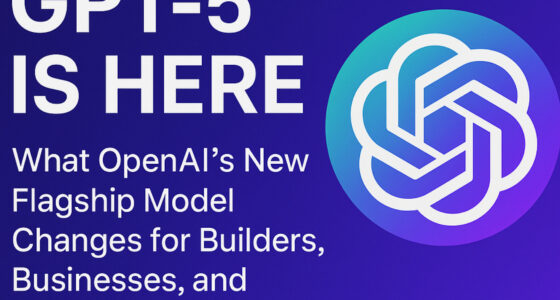Introduction
Two very different industries—finance and commercial aviation—have recently unveiled early evidence that generative‑AI tools can deliver tangible business results.
- JPMorgan Chase is using an internal AI coding assistant to help software engineers write and review code. Tens of thousands of developers at the bank report 10–20 % productivity improvements and leadership estimates that AI could add roughly US$1–1.5 billion in incremental valuereuters.com.
- Delta Air Lines is testing an AI pricing system, developed with Israeli startup Fetcherr, to recommend airfare prices. The tool already covers about 3 % of Delta’s domestic flights and aims to reach 20 % by the end of 2025investopedia.com; early unit‑revenue results have been described as “amazingly favorable”investopedia.com.
Both announcements have sparked excitement and controversy. JPMorgan’s internal productivity gains are pushing other banks to accelerate their own AI initiatives, while Delta’s pricing trial has drawn scrutiny from rivals and U.S. lawmakers concerned about fairness and privacy.
This article examines what these AI roll‑outs reveal, how they could reshape competition and customer experiences across key verticals, and what challenges lie ahead.
JPMorgan’s Coding Copilot: A Benchmark for AI Productivity
What the bank has done
At its March 2025 DevUp conference, JPMorgan Chase disclosed that tens of thousands of its software engineers were using an in‑house coding assistant built on large language models. Global chief information officer Lori Beer said that developers saw 10–20 % productivity gains, allowing them to focus on high‑value AI and data projectsreuters.com. She noted that the bank’s tech workforce (about 63 000 employees) represents roughly 21 % of JPMorgan’s global headcount and that the tool’s efficiency gains create capacity for new projectsreuters.com. Jamie Dimon, the bank’s CEO, has said these AI initiatives could add US$1–1.5 billion in value for the firmreuters.com.
JPMorgan’s technology budget was US$17 billion in 2024reuters.com, and the bank already has around 450 potential AI use cases with plans to double that pipelinereuters.com. The internal tool helps with code generation, review, documentation and unit‑test writing. Importantly, it is customized to JPMorgan’s secure environment, which mitigates data‑privacy risks that come with off‑the‑shelf AI services.
Competitive response in finance
JPMorgan’s early numbers set a high bar for other banks. Research firm Training the Street reports that Barclays has rolled out a Colleague AI Agent that integrates with Microsoft 365 Copilot; the pilot involved 15 000 employees and is being expanded to about 100 000 stafftrainingthestreet.com. Barclays is also deploying developer copilots for coding, document analysis and process automation within its secure systemstrainingthestreet.com. Other banks, such as MUFG and BNP Paribas, are experimenting with similar tools across investment banking, retail banking and risk managementtrainingthestreet.com. These moves illustrate a broad competitive response: AI‑driven productivity is quickly becoming table stakes in financial services.
Despite this momentum, most banks trail JPMorgan in scale and integration. JPMorgan’s GenAI suite reportedly serves more than 200 000 employees and underpins everything from document summarization to portfolio analysis. Competitors now face pressure to invest comparable resources or risk losing both talent and operating leverage.
Impact on customers
For customers, AI‑enabled productivity should translate into faster software releases, richer functionality and better risk controls. Developer tools expedite the creation of new digital products, while AI‑assisted code review can reduce bugs and security vulnerabilities. In risk and compliance, LLMs help analyze large volumes of transactions and documentstrainingthestreet.com, which may lead to earlier fraud detection and more accurate regulatory reporting. However, efficiency gains might also lead to workforce realignments, creating anxiety among some employees. JPMorgan emphasizes that freed‑up engineers will be reassigned to high‑value projectsreuters.com rather than replaced.
Delta’s AI‑Driven Pricing: Decision Support or Price Discrimination?
What Delta is testing
Delta Air Lines is piloting an AI pricing system built by Fetcherr, an Israeli startup. On Delta’s July 2025 earnings call, president Glen Hauenstein said the tool currently sets prices on around 3 % of domestic flights and will expand to about 20 % by year‑end 2025investopedia.comthepointsguy.com. He described the model as a constantly running “super analyst” that learns from each pricing decision, with early results showing “amazingly favorable unit revenues”investopedia.com. The company has been gradually introducing the technology after a trial started in late 2024.
The system works by ingesting historical booking data, demand forecasts, competitor pricing and seat‑inventory information to recommend fare levels. Hauenstein has said Delta hopes to create an “offer‑management” capability where price and seat availability are continuously optimizedinvestopedia.com.
Regulatory pushback and clarification
Delta’s AI pricing trial has attracted criticism. In July 2025 three U.S. senators—Ruben Gallego, Mark Warner and Richard Blumenthal—wrote to CEO Ed Bastian warning that personalized pricing could raise fares to each customer’s “personal pain point” and raise data‑privacy concernsreuters.com. They noted Delta’s plan to deploy the technology across 20 % of its domestic networkreuters.com and asked the carrier whether the system targets individual passengers.
Delta responded that its AI pricing tool is a decision‑support system, not a personalized surveillance tool. In an open letter, Peter Carter, the airline’s chief external affairs officer, stated that Delta “has no fare product that targets customers with individualized prices based on personal data”news.delta.com. He emphasized that the system uses aggregated data, follows publicly filed fare rules and is intended to eliminate manual processes rather than discriminatenews.delta.com. The letter listed use cases—aggregating purchasing data, forecasting demand, adapting to market conditions and processing thousands of variables simultaneouslynews.delta.com. Delta also pointed out that the airline and its competitors have used dynamic pricing for decadesreuters.com and that AI simply allows faster and more nuanced adjustments.
Competitor reaction
Delta’s experiment has unsettled rivals. On a July 2025 earnings call, American Airlines CEO Robert Isom said his carrier would not adopt AI‑based individualized pricing, calling such schemes a “bait and switch” and warning that they could erode customer trustinvestopedia.com. Isom acknowledged that American uses AI to operate more efficiently and to showcase amenities, but insisted that personalized fare pricing “is not something we will do”investopedia.com. Simple Flying reported that American sees Delta’s use of AI pricing as potentially harmful and promised not to “trick” customerssimpleflying.com. United and Southwest have also indicated that they use AI for operational forecasting rather than for passenger‑specific pricing, and some analysts note that regulatory risk may deter broader adoption.
Impact on customers
For consumers, the prospect of AI‑driven pricing evokes both potential benefits and risks:
- More flexible fares: AI can adjust prices in real time to match demand and competitor actions, potentially generating discounts on low‑demand flights. Delta’s early results suggest improved revenue managementinvestopedia.com, which could free up resources for better service or lower fares elsewhere.
- Fairness concerns: Senators warned that AI could raise prices to an individual’s “pain point”reuters.com. While Delta denies using personal datanews.delta.com, the combination of extensive customer profiles and predictive analytics could enable price discrimination if not carefully governed. Consumer groups worry about transparency and the potential for hidden surcharges.
- Customer trust: Competitor airlines have publicly promised not to use AI in this wayinvestopedia.com, positioning themselves as customer‑friendly alternatives. The debate could influence brand loyalty and demand for regulation.
Broader Implications Across Vertical “Vertices”
Financial services
JPMorgan’s success suggests that generative AI coding assistants can become mainstream across large enterprises. Banks invest heavily in technology and must deliver secure, compliant systems. The reported 10–20 % productivity gainsreuters.com are significant in a sector where tens of thousands of developers maintain legacy codebases. As Barclays, MUFG and BNP Paribas expand their own AI‑agent programstrainingthestreet.comtrainingthestreet.com, the competitive landscape may shift in three ways:
- Efficiency races: Banks able to deliver projects faster and with higher quality will take market share, particularly in digital payments, wealth platforms and regulatory compliance. AI may become a precondition for innovation rather than a differentiator.
- Talent dynamics: Developer satisfaction could improve with AI support. However, institutions that fail to adopt effective AI tools may struggle to recruit and retain top engineers.
- Risk and oversight: AI deployment requires robust governance. Models trained on proprietary financial data must comply with privacy laws and avoid hallucinations. Regulators may scrutinize AI decisions that could affect credit scoring or capital markets.
Travel and transportation
In aviation, AI pricing experiments highlight how technology can disrupt revenue management:
- First‑mover advantage vs. backlash: Delta hopes to gain a head start in learning how AI can optimize faresinvestopedia.com. If its AI system generates sustained revenue improvements without alienating travelers, other airlines may adopt similar tools despite current hesitationsimpleflying.com. Conversely, public and regulatory pushback could force airlines to limit personalization or face new legislation.
- Industry standards and fairness: Airlines may need to establish common principles for AI pricing—similar to how dynamic pricing rules are filed with ATPCO—and communicate them clearly to maintain trust. Delta’s letter emphasizes that fares remain publicly filed and that AI recommendations are reviewed by human analystsnews.delta.com.
- Competition from other modes: If consumers perceive airline pricing as unfair or opaque, they may shift to alternative travel modes or carriers that pledge transparency. Travel loyalty programs and regulatory bodies could become battlegrounds for trust.
Beyond finance and travel
Although this discussion focuses on banks and airlines, the themes extend to other verticals:
- Retail and e‑commerce: Many retailers already use AI for inventory management and dynamic pricing. In ride‑hailing, Uber’s surge pricing algorithm adjusts fares based on demand and supply, notifying users when rates increaseuber.com. The debate over Delta’s AI pricing foreshadows similar scrutiny of personalized pricing in other consumer markets.
- Healthcare and insurance: Insurers could deploy AI models to personalize premiums based on health data, raising ethical and regulatory questions. Hospitals might use AI to schedule staff and allocate resources. Productivity benefits will be weighed against fairness and privacy concerns.
- Manufacturing and logistics: Generative AI assistants can help engineers design products, generate documentation and optimize supply chains. Efficiency gains may reduce costs but also reshape the workforce.
Conclusion
JPMorgan’s and Delta’s AI initiatives illustrate the dual nature of generative‑AI adoption. In banking, AI coding assistants have produced measurable productivity gains, creating competitive pressure for rivals to follow. The improvements promise better software quality and speed but also require careful management of workforce transitions and model governance.
In aviation, Delta’s AI pricing trial demonstrates how machine intelligence can optimize revenue but also highlights the ethical and regulatory tensions around personalized pricing. Competitors like American Airlines are positioning themselves as guardians of customer trust by pledging not to employ such toolsinvestopedia.com, while U.S. lawmakers seek assurances that AI does not exploit personal datareuters.com. The outcome will shape not only airline revenue strategies but also the broader perception of AI‑driven price optimization across industries.
As AI becomes woven into the fabric of every enterprise, organizations should pursue responsible adoption—building transparent, fair and secure systems that balance efficiency with customer trust. For consumers, it means paying attention to how personal data is used and advocating for clear disclosures. For regulators, it means crafting rules that allow innovation while preventing abuse. The early lessons from JPMorgan and Delta show that the AI race is not only about technology—it is about trust, fairness and strategic advantage.









